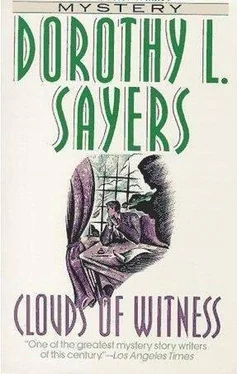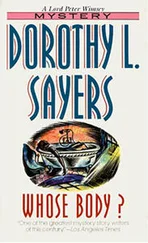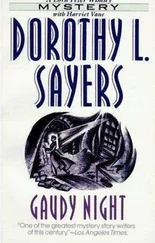"No, no," said Mr. Murbles, clearing his throat. "Excuse me a moment, madam. Sir Impey."
The lawyers whispered together in the window-seat.
"You see," said Sir Impey, "she has burnt her boats pretty well now by coming at all. The great question for us is, Is it worth the risk? After all, we don't know what Wimsey's evidence amounts to."
"No, that is why I feel inclined-in spite of the risk-to put this evidence in," said Mr. Murbles.
"I am ready to take the risk," interposed Mrs. Grimethorpe starkly.
"We quite appreciate that," replied Sir Impey. "It is the risk to our client we have to consider first of all."
"Risk?" cried Mary. "But surely this clears him!"
"Will you swear absolutely to the time when his grace of Denver arrived at Grider's Hole, Mrs. Grimethorpe?" went on the lawyer, as though he had not heard her.
"It was a quarter past twelve by the kitchen clock-'tis a very good clock."
"And he left you at-"
"About five minutes past two."
"And how long would it take a man, walking quickly, to get back to Riddlesdale Lodge?"
"Oh, well-nigh an hour. It's rough walking, and a steep bank up and down to the beck."
"You mustn't let the other counsel upset you on those points, Mrs. Grimethorpe, because they will try to prove that he had time to kill Cathcart either before he started or after he returned, and by admitting that the Duke had something in his life that he wanted kept secret we shall be supplying the very thing the prosecution lack-a motive for murdering anyone who might have found him out."
There was a stricken silence.
"If I may ask, madam," said Sir Impey, "has any person any suspicion?"
"My husband guessed," she answered hoarsely. "I am sure of it. He has always known. But he couldn't prove it. That very night-"
"What night?"
"The night of the murder-he laid a trap for me. He came back from Stapley in the night, hoping to catch us and do murder. But he drank too much before he started, and spent the night in the ditch, or it might be Gerald's death you'd be inquiring into, and mine, as well as the other."
It gave Mary an odd shock to hear her brother's name spoken like that, by that speaker and in that company.
She asked suddenly, apropos of nothing, "Isn't Mr. Parker here?"
"No, my dear," said Mr. Murbles reprovingly, "this is not a police matter."
"The best thing we can do, I think," said Sir Impey, "is to put in the evidence, and, if necessary, arrange for some kind of protection for this lady. In the meantime-''
"She is coming round with me to mother," said Lady Mary determinedly.
"My dear lady," expostulated Mr. Murbles, "that would be very unsuitable in the circumstances. I think you hardly grasp-"
"Mother said so," retorted her ladyship. "Bunter, call a taxi."
Mr. Murbles waved his hands helplessly, but Sir Impey was rather amused. "It's no good, Murbles," he said. "Time and trouble will tame an advanced young woman, but an advanced old woman is uncontrollable by any earthly force."
So it was from the Dowager's town house that Lady Mary rang up Mr. Charles Parker to tell him the news.
The Eloquent Dead
" Je connaissais Manon: pourquoi m'affliger tant d'un malheur que j'avais dupre voir. "
– Manon Lescaut
The gale had blown itself out into a wonderful fresh day, with clear spaces of sky, and a high wind rolling boulders of cumulus down the blue slopes of air.
The prisoner had been wrangling for an hour with his advisers when finally they came into court, and even Sir Impey's classical face showed flushed between the wings of his wig.
"I'm not going to say anything," said the Duke obstinately. "Rotten thing to do. I suppose I can't prevent you callin' her if she insists on comin'-damn' good of her-makes me feel no end of a beast."
"Better leave it at that," said Mr. Murbles. "Makes a good impression, you know. Let him go into the box and behave like a perfect gentleman. They'll like it."
Sir Impey, who had sat through the small hours altering his speech, nodded.
The first witness that day came as something of a surprise. She gave her name and address as Eliza Briggs, known as Madame Brigette of New Bond Street, and her occupation as beauty specialist and perfumer. She had a large and aristocratic clientele of both sexes, and a branch in Paris.
Deceased had been a client of hers in both cities for several years. He had massage and manicure. After the war he had come to her about some slight scars caused by grazing with shrapnel. He was extremely particular about his personal appearance, and, if you called that vanity in a man, you might certainly say he was vain. Thank you. Sir Wigmore Wrinching made no attempt to cross-examine the witness, and the noble lords wondered to one another what it was all about.
At this point Sir Impey Biggs leaned forward, and, tapping his brief impressively with his forefinger, began:
"My lords, so strong is our case that we had not thought it necessary to present an alibi-" when an officer of the court rushed up from a little whirlpool of commotion by the door and excitedly thrust a note into his hand. Sir Impey read, coloured, glanced down the hall, put down his brief, folded his hands over it, and said in a sudden, loud voice which penetrated even to the deaf ear of the Duke of Wiltshire: "My lords, I am happy to say that our missing witness is here. I call Lord Peter Wimsey."
Every neck was at once craned, and every eye focused on the very grubby and oily figure that came amiably trotting up the long room. Sir Impey Biggs passed the note down to Mr. Murbles, and, turning to the witness, who was yawning frightfully in the intervals of grinning at all his acquaintances, demanded that he should be sworn.
The witness's story was as follows:
"I am Peter Death Bredon Wimsey, brother of the accused. I live at 110a Piccadilly. In consequence of what I read on that bit of blotting-paper which I now identify I went to Paris to look for a certain lady. The name of the lady is Mademoiselle Simone Vonderaa. I found she had left Paris in company with a man named Van Humperdinck. I followed her, and at length came up with her in New York. I asked her to give me the letter Cathcart wrote on the night of his death. (Sensation.) I produce that letter, with Mademoiselle Vonderaa's signature on the corner, so that it can be identified if Wiggy there tries to put it over you. (Joyous sensation, in which the indignant protests of prosecuting counsel were drowned.) And I'm sorry I've given you such short notice of this, old man, but I only got it the day before yesterday. We came as quick as we could, but we had to come down near Whitehaven with engine trouble, and if we had come down half a mile sooner I shouldn't be here now." (Applause, hurriedly checked by the Lord High Steward.)
"My lords," said Sir Impey, "your lordships are witnesses that I have never seen this letter in my life before. I have no idea of its contents; yet so positive am I that it cannot but assist my noble client's case, that I am willing-nay, eager-to put in this document immediately, as it stands, without perusal, to stand or fall by the contents."
"The handwriting must be identified as that of the deceased," interposed the Lord High Steward.
The ravening pencils of the reporters tore along the paper. The lean young man who worked for the Daily Trumpet scented a scandal in high life and licked his lips, never knowing what a much bigger one had escaped him by a bare minute or so.
Miss Lydia Cathcart was recalled to identify the handwriting, and the letter was handed to the Lord High Steward, who announced: "The letter is in French. We shall have to swear an interpreter."
Читать дальше
Конец ознакомительного отрывка
Купить книгу












